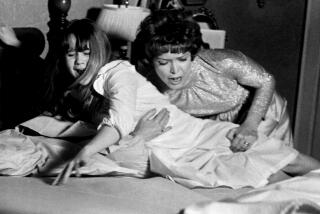In Love With the Girl With the Mouth : EMMA WHO SAVED MY LIFE <i> by Wilton Barnhardt (St. Martin’s Press: $19.95; 470 pp.; 0-312-02911-X) </i>
He’s OK, she’s not OK.
It was that dreadful decade, the one during which no one can remember what he was doing--other than being nostalgic for the ‘60s or secretly prepping for the entrepreneurial ‘80s. John Travolta, “Three’s Company,” est, “How to Be Your Own Best Friend,” gas lines and Amy Carter. Or, worse still, Jimmy Carter. No wonder people suppressed most of it.
Wilton Barnhardt, however, seems to remember it all, and in “Emma Who Saved My Life,” his first novel, he performs the minor miracle of bringing it all back with not only accuracy but charm, too. The story of a young man (Gil Freeman) trying to make it as an actor in New York, “Emma,” which actually runs from 1974 to 1983, displays the ‘70s’ artifacts and lingo (“one classy dude”) with superb precision. Automatic tellers and “pretentious foreign ice cream” appear in the novel right at the point they came into real life.
Barnhardt even remembers Mayor Beame, and as someone who’s been around New York for many years, I can tell you that nobody , with the possible exception of Mrs. Beame, remembers Abe Beame.
In Wilton Barnhardt we have a new novelist who looks around him instead of just into his own coke-filled navel, a young novelist with a sense of history, even if it’s only recent history. He is, with equal rarity, a novelist whose attitude is friendly and whose hero, instead of being too-sensitive-to-live, is a sweet, unpretentious guy.
Gil arrives in New York on the day Nixon resigns, the true beginning of the ‘70s: “Somewhere on the bus ride between Southwestern Illinois University and Port Authority, I can assure you, Lisa, I ceased being the theater-department sophomore jerk and became a full-fledged budding actor-in-New York jerk.”
Lisa is one of his roommates; the other is Emma Gennaro, a hypochondriacal celibate (“you know how I feel about viscosities”) who supports her poetry-writing ambitions by working for such enterprises as Baldo’s Pizza and a phone-sex service. Emma is a scared little (supposed) cynic who’s got some mouth on her. She can go to a pretentious party and chew up the guests like a verbal chain saw, but the slightest criticism in return “brings her to the verge of tears.” She’s the sort of person you want to hug and shut up simultaneously.
Gil is, of course, in love with her, but it isn’t going to work. (Alas, the steadiest girl he’ll find is someone he meets in a Herpes Victims Support Group.) He knows it isn’t going to work with Emma because, as he puts it succinctly: “Emma was born to be depressed, I was not.” When Gil gets a job at the crummy Venice Theatre--which stages “Burn It Down,” “an unsuccessful Black Rage play,” on weekdays and “Peter Cottontail” on weekends--he is “ONE HAPPY BOY,” flying home to tell his female roommates.
A decade of trying and mostly failing gives Gil an extra layer of New York skin, and he can even work himself up into a tirade against his awful agent, Odessa Benbow (“Foul old ugly Napoleonic five-foot mutant woman”), but even Odessa seems to fascinate him as one more item tumbling out of New York’s dirty, endlessly spilling Horn of Plenty.
“Emma’s” theater scenes are laugh-riots. How Gil and fellow actor Bonnie McHenry improvise their way through a performance during which the lead has passed out drunk is the funniest bit of written catastrophe-comedy since Larry McMurtry sent Royce and his truck to bust up the dance hall in “Terms of Endearment.”
Gil is only ready to leave New York when, in 1983, he realizes: “I wasn’t really all that talented.” His creator, Wilton Barnhardt, is very talented. “Emma” reads at a tremendously energetic clip.
Those parts of the book not told in dialogue seem as if they are, so chatty is Gil’s first-person narrative style (“Oh wait. You gotta hear this one”). For those lines that Gil actually does speak, to Emma or somebody else, Barnhardt has come up with the witty, and characterizing, notion of leaving off the quotation marks. The effect is sweetly modest, as if Gil is too sheepish to claim a full voice for himself.
This is an immensely winning book. Its publishers declare it to be not hippie, not yuppie, not minimalist, and not disenchanted. Blurbs are the last totally unregulated form of advertising, but these four disclaimers are nothing but the truth.
Gil consistently looks after the reader’s best interests and comfort, advising at one point: “If you can help it you should never get to I have been lonely all my life, and having decided that, you should NEVER let it slip even lower to I WILL be lonely all my life . Or else, you’ll be as depressed as me in 1977 and you wouldn’t want that.”
If you read “Emma” this summer, you needn’t worry.
More to Read
Sign up for our Book Club newsletter
Get the latest news, events and more from the Los Angeles Times Book Club, and help us get L.A. reading and talking.
You may occasionally receive promotional content from the Los Angeles Times.









